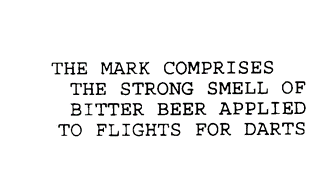The tenth edition of The Masters takes place this weekend. The 24 best dart players in the world will compete at the Marshall Arena in Milton Keynes, England. In Belgium too, fans are glued to their tv sets, hoping for many 180s. When we think of darts, however, trademark law comes to mind. Allow us to explain…
Darts and bitter beer
The most commonly registered trademarks are images, words or combinations of both. This makes sense: the name of your product or service and your logo are the most important recognition points for consumers. As a company, you want to avoid these being copied by competitors.
But you can also protect other ‘signs’ as trademarks. This makes sense too, given that other elements also help consumers recognise that your company is behind a certain product or service
Non-traditional trademarks
Did you know, for example, that the position of a specific element on a product can be registered as a ‘position mark’? Think of the red label on the pockets of a pair of LEVI’S trousers. In itself a trivial piece of fabric, but instantly recognised because it’s always in the same place. That is why it was protected as a position mark.
Every sign that serves as a recognition point for the consumer can be registered as a trademark. Think of holograms, sounds, colours, etc. You can then prevent someone else from using similar signs. We call these ‘non-traditional trademarks’.
Scent marks
Of all the non-traditional brands, scent marks are probably the most difficult to get registered. This is due to the criteria that non-traditional trademarks must meet to complete the registration process.
In particular, certain conditions apply when submitting the trademark application: how do you represent the sign you want to regsiter in the application? The conditions that apply in the EU were defined in the Sieckmann decision of 2002:
Firstly, the sign must be presented clearly, precisely and objectively. In addition, the representation must be easily accessible, intelligible and self-contained, so that everyone can find what exactly is protected. A chemical formula, for example, is not comprehensible to everyone. Non-chemists will not be able to define the scent represented by a chemical formula.
Finally, the representation must also be durable and objective. This means that an odour sample does not qualify as a representation, as the odour may dissipate or change over time and the specific odour of a substance is subjective.
In 2017, the rules for the representation of marks were relaxed. The former requirement that they be ‘graphically representable’ was removed. As a result, you can now, for example, upload an mp3 of a jingle in your EU trademark application. This makes sense, as almost anyone who has access to the trademark register can play an mp3.
For fragrances, there is not yet a standard way of presenting which is clear, precise, complete, easily accessible, durable and objective. We occasionally hear about machines being developed that can mimic scents, but these are not up to scratch yet and are certainly not easily accessible.
So although we are seeing more and more holograms, position marks, etc. appearing in the trademark registers, it will be some time before scent marks appear in the registers.
Actually, we should put it differently: before scent marks will appear in the registers again. Of course, trademark registrations already existed before the Sieckmann case of 2002. Some national trademark offices were less strict at the time, which led to the registration of a few scent trademarks in the 1990s.
Darts
And so we come to darts: one of the few remaining scent brands in Europe is a British brand for darts. In 1994, Unicorn Products managed to register ‘the strong smell of bitter beer’ as a trademark for darts. The specific scent released when opening their packaging was a recognition point for their flights and this was considered a registrable mark.

The description of the scent mark in the 1994 trademark registration
Trademark registration can be renewed every ten years, and Unicorn Products has consistently done so. As a result, they now own a rather unique right, at least until 2024: a scent mark registration.
Wij helpen jou graag verder!
Je bent welkom met al jouw juridische vragen. Contacteer ons voor een vrijblijvend intakegesprek.